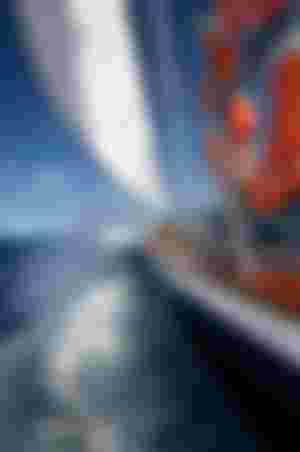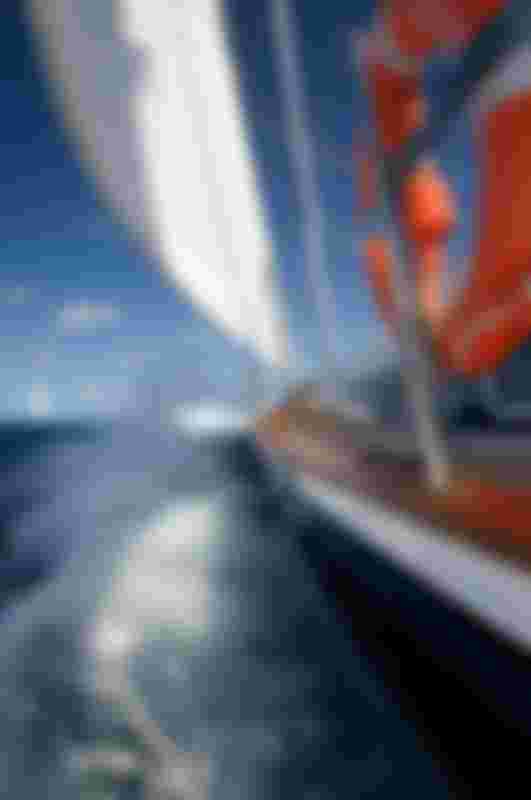Sailing is all about control: a sailboat is a tool designed to harness the wind and tame the seas. Sailors sit in their saddle, high atop the packhorse waters, using the reins to pull on the bit behind the teeth of the Clydesdale winds--masters of the elements.
Most sailors aren't scientists but we use science to explain our methods: vectors plot out force, The Venturi Effect explains sailing into the wind, displacement keeps the boat afloat. We imagine ourselves rugged techno-geeks. We fill our navigation stations with radios and GPS Systems. We attach Automatic Pilots to our steering. We feel like laser-guided Vikings conquering the open seas. The gadgets make sailors complacent; the science make sailors complacent--we depend upon what we don't understand.
Unworried, we live upon a paradox- a thin layer of hardened fibre glassheld upright by the Keel's Sisyphean effort to drag the boat straight to the bottom conflicting with the water's desire to keep her afloat.
The question "why I am floating?" usually never crosses my mind. It doesn't penetrate my dreams as I lie sleeping, the boat gently cradled by the water, a soft lap, lap of wavelets against her hull. Even the occasional tac, tac, tang of a loose line against the mast won't call up nightmares. It doesn't cause me to rush breakfast: burning the bacon and filling the low-ceilinged cabin with acrid blue smoke. It doesn't trip up my feet as I rig lines on the foredeck. I don't fall to my knees and kiss the ground each time I reach shore.

Protected by science and technology, I am soothed by the boat's gentle rocking. I gaze at the spinnaker's bright colours lit by the sun, smell the clean south wind's warmth. As water burbles, dad plays the sail; as lines creak, Dom reads on the foredeck;and as sails flap, I sit in the cockpit sipping a beer thinking this is perfect.
Four hours later, garbed head to toe in wet gear, I steer into the cold teeth of twenty knots of wind from the northeast. "This is starting to really suck, Dad." We have reefed every possible inch of cloth. Our rig looks like two napkins bravely clinging to clotheslines in a hurricane. The water is an ugly translucent slate colour, and the waves, eight to ten feet high and jagged in the way only a Great Lakes chop can be, come at us from two directions. Cross-chop. We're getting pounded.
The prow of the boat slams into a wave straight on-death to small sailboat. Firts, there's the booming sound, like the boat is saying oof! After being poked in the stomach with a baseball bat, then eveeything lurches forward. Hit two waves in a row like this and the boat stops. Without forward momentum, the boat can't be steered. If the waves knock her through the wind, and she tacks in twenty five knots while the crew isn't ready... Instant disaster.
To avoid pounding I steer across the wave's faces. I establish a rhythm: up into the crest, down off the crest. I become the boat, feeling her waterline, sensing her balance point to keep her smooth in the water. Holding the wheel in a death grip, I feel the currents of the waves jerking at the rudder, trying to throw me off course. I can feel the tension in the boat: the stays and shrouds humming, the hull resisting the punching seas. The mast creaks. A loose sheet bangs a manic tattoo on the foredeck. My shoulders ache from fighting the water, I'm getting tired. It's getting dark.
"We can't do this all night," I say to no one in particular-I'm too tired to think of alternatives. We hit a wave smack on the nose. Whu-ump! My chest slams against the arc of the wheel.
Dad's starts muttering, eyes in that half-gaze that means he's thinking. "....nothing left to reef, can't motor--'d have to steer, auto won't work in this chop..."
Uncle Dom pukes over the side; Dad's not looking so good either. I'm too busy to get sick, but they're hunkered in the cockpit under the awning getting tossed around. Then Dad's face lights up. "Well hove--to."
To heave to you tack but leave to Genoa cleated, so it backwinds, then you cleat the mainsail on the other tack, and stop steering. Sailors are control freaks. If they are going to give up control, then it's going to be to a machine designed to do the task. When a boat is hove to, you give up control to the wind. The idea is that as each sail backwinds, the prow of the boat slaloms through the head of the wind and kind of wallows forward like a drunken sailor. It reduces her speed, how much she heels, and the strain on her, but you have to let go. Let her take care of herself. When your life's on the line this is hard to do.
We are hove to. I sit behind the wheel staring stupidly as it spins. My hands clench. "Go to bed now on the floor." I not at dad.
I take the cushions off the seat and toss them on the floor. I check the table and kitchen area by the gangway to make sure there isn't anything dangerous left to fall down. I flop on the cushions in my clothes and try to sleep. I remember the nearest

Author's Note :
I've come to notice that many author's end chapters with little requests for votes. I'm not really all that interested in votes (by all means do, if you like this work, but really, I vote to keep track of my place in a book, so it's not something I live for). What I do desire is comments from readers.
I'm likely going to have a series of sailing related writing, so I'm interested to know if I've struck a good balance with jargon and explanation. (Without getting too heavy handed.)

My Previous Article :




Ang galing naman po!